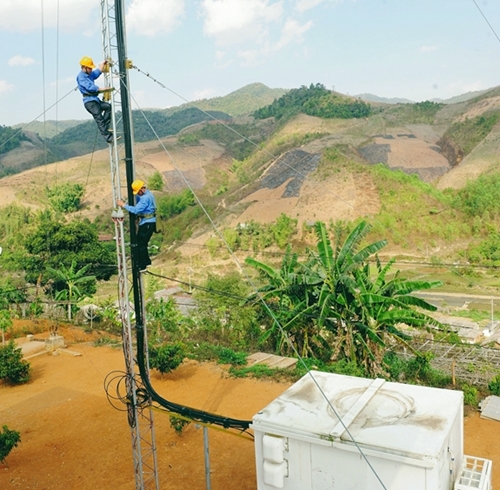Bringing mobile coverage to borders and islands is never easy because the terrains are treacherous and the work requires involvement of a number of human and materials, and investment in these areas is unprofitable. However, with the view that "wherever people and troops are, there is Viettel’s coverage," Viettel Networks Corporation, an affiliate of the Military Industry-Telecoms Group (Viettel), always tries its best to surmount difficulties to install more base transceiver stations (BTSs) in these areas, contributing to safeguarding the national sovereignty.
Partly digitizing border areas and islands
    |
 |
|
Viettel Networks Corporation will expand Viettel networks in border areas. |
Viettel has carried out network coverage in border areas since it started building and developing mobile networks nationwide over 15 years ago. From just dozens of BTSs in 2004, Viettel now has put into operation nearly 2,000 BTSs along the borderline, and more than 2,000 others at sea and on islands.
In 2020 alone, Viettel deployed 1,158 military transmission lines, bringing the total number of the group's transmission lines for national defense and security affairs to more than 1,216 lines, equivalent to 8,458km.
Especially, since 2017, Viettel has covered networks in several border posts, namely A Pa Chai (in Muong Nhe, Dien Bien), Lung Cu (in Dong Van, Ha Giang), Ta Gia Khau (Muong Khuong, Lao Cai), 680 Rach Tau (Ngoc Hien, Ca Mau), among others.
In the context of Industry 4.0, Viettel’s coverage in these areas has helped promptly “digitize” the lives of local people and troops, laying the foundation to accelerate the e-government realization. In addition, the 4G coverage has helped facilitate the sending of documents and other reports with just one click, and gather participants via online meetings, contributing to saving time, efforts, and money.
Notably, with a smartphone and 4G coverage, people can stay at home learning about the State’s policies, production and husbandry-related science and technology, to name but a few.
Moreover, with Viettel’s 4G coverage, cadres and teachers in mountainous areas and island localities find it easier to get access to e-learning to improve their professional expertise in an effective manner.
Viettel’s coverage in mountainous areas
Rough terrains in border areas require high resolve of workers in charge of installing BTSs.
For Viettel personnel who have been trying to cover border posts with networks, living far from family for a long time, climbing passes, wading streams, constructing without electricity, being bitten by forest mosquitoes and other insects, transporting equipment by themselves for many hours, among others are normal things.
Regarding these things, Major Nguyen Thi Tam, Deputy General Director of Viettel Networks Corporation recalled difficulties facing Viettel workers during the erection of a BTS in Dak No Border Post in Bu Gia Map district, Binh Phuoc province.
Tam said that the border post is garrisoned in a basin terrain surrounded by high mountains, which is far from Viettel’s 2G/3G/4G stations and even Metfone’s stations nearby, requiring Viettel workers to install a 13km underground cable line along the border patrol road in the mountain. During one month of deploying the cable line, Viettel workers had to wear gloves to prevent mosquitoes and insects.
Transportation was also a matter. Construction materials and equipment for BTS installation were transported from the center of Phuoc Long district, some 70km from Dak No Border Post. Meanwhile, the border patrol road going along Bu Gia Map National Park is narrow and winding, making the transportation of materials and equipment difficult. Notably, from the foot of the hill to the post, no motor vehicles but human could carry the materials and equipment.
“Whenever the network is connected, seeing border guards excited, I am touched and happy. Happy because I could bring joy to those who directly safeguard the national border. That is our driving force,” said Nguyen Van Hung, a staff of Viettel Networks Corporation.
Expanding 4G coverage
It costs Viettel hundreds of billions of VND to cover border posts with networks. In fact, the cost for BTS installation in these border posts doubles that in the lowland. Moreover, many BTSs here serve only dozens to hundred subscribers while each BTS in the lowland serves some 2,000 customers on average.
Major Nguyen Thi Tam emphasized that Viettel Networks Corporation is fully aware that developing network infrastructure is for production and business in combination with implementing defense and security tasks. The target of installing these BTSs is not for profit but for ensuring defense-security affairs, contributing to national border defense. She stressed Viettel’s standpoint that “wherever the people and troops are, there is Viettel’s coverage.”
Covering the border areas with networks requires great efforts from Viettel and its personnel. It also demonstrates the group’s progress in science and technology, especially telecommunications.
To increase network coverage and quality in border areas and border posts, Viettel is currently applying 2G/3G/4G technologies with large-capacity equipment, high-gain antennas, remote coverage support features together with specialized wave extension devices. In order to protect equipment from being corroded by sea salt, Viettel has experimented with many technologies such as anti-sea salt coating. In 2020, Viettel tested nano coating for AC to DC converters at many places on islands to limit the corrosion of sea salt.
In the coming time, Viettel Networks Corporation will install more 4G BTSs in border areas and border posts to meet the development road-map of Viettel networks and global trends. It will expand 4G coverage at border checkpoints and border patrol roads with a motto “Getting Viettel’s 4G connection wherever the phone is on in Vietnam.”
Translated by Mai Huong